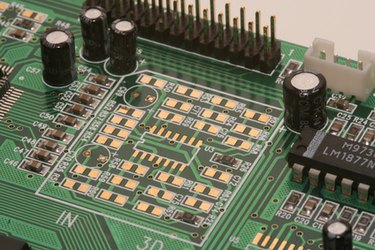
The invention of the transistor represents a major milestone in electronics and science in general. As an outgrowth of World War II-era technology, transistors largely replaced vacuum tubes in computers, radios and other devices through the 1950s and '60s. Today transistors power everything from cell phones to supercomputers, all of which take advantage of their numerous advantages.
Size
One of the biggest advantages of using transistors is their small size. Even though vacuum tubes have continued to grow smaller over the years, transistors have decreased to literally microscopic proportions. The size difference between vacuum tubes and early transistors was the reason computers went from room-sized appliances to desktop devices in the span of a few decades. Transistors are simple enough that they could one day be composed of just a few dozen atoms. This is especially important in the field of computer chip making, where thousands of transistors need to be fit onto a chip for maximum computing power.
Video of the Day
Weight
In addition to being smaller, transistors are lighter than their vacuum tube counterparts. This has all of the advantages of a smaller size and also makes transistors perfect for use in mobile electronic devices or scientific instruments.
Heat
Transistors produce far less heat than vacuum tubes. A lower thermal envelope means that they can be packed more densely in an electronic device and that they don't require a large and complex cooling system to remain functional over long periods of time.
Power Consumption
Transistors also have the advantage of consuming less power than vacuum tubes. This means that they are more efficient and cost less to operate. It also allows engineers to use transistors in battery powered devices without significantly sacrificing battery life.
Durability
Transistors are very durable, in part because of their simple design and metallic construction. Vacuum tubes use a glass bulb that is subject to breakage and must be handled carefully. Only transistors are suitable for electronic devices that need to withstand impact or continue to operate even in extreme environmental conditions.